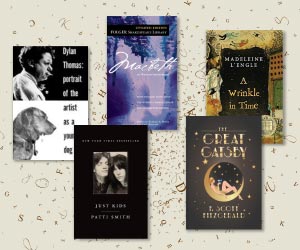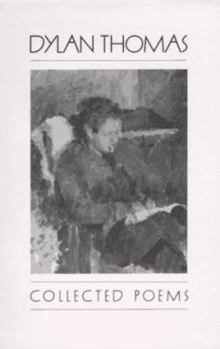Collected Poems: Dylan Thomas
Select Format
Select Condition 
Book Overview
The Collected Poems of Dylan Thomas contains poems that Thomas personally decided best represented his work. A year before its publication Thomas died from swelling of the brain triggered by excessive... This description may be from another edition of this product.
Format:Paperback
Language:English
ISBN:0811202054
ISBN13:9780811202053
Release Date:January 1971
Publisher:New Directions Publishing Corporation
Length:203 Pages
Weight:0.53 lbs.
Dimensions:0.5" x 5.2" x 8.0"
Customer Reviews
5 ratings
Dylan Thomas as he wanted to be remembered
Published by Thriftbooks.com User , 20 years ago
The question is, do you get this book for cheap, or the brand new POEMS OF DYLAN THOMAS [WITH CD] for not cheap. That depends on your wallet and your love of Thomas.If you are new to Thomas, perhaps coming here intrigued after reading the often-anthologized "Do Not Go Gentle into That Good Night," I heartily recommend this book. These are all the poems Thomas wanted to live on in his name. They are excellent across the board, with a lot that I personally really loved. Thomas in some ways reminds me of Auden or Yeats (or even Blake) in terms of his mysticism and commitment to sound and form. I also think of Poe, who is often criticized by literary types, but much loved by the general public. There's a reason Thomas is popular. Even his most fantastical lines have a way of resonating. Many are unforgettable:"Your mouth, my love, the thistle in the kiss?"For those who already know they love Thomas, the new book + CD is a worthy investment. There's nothing wrong with this one though. It fits in a (coat) pocket and contains everything Thomas wanted, plus the posthumous "Elegy." It is tragic he died young, but he left some great work behind. This is it in a nutshell. Highly recommended, 5/5 stars.
Writing with pure lightning
Published by Thriftbooks.com User , 21 years ago
Spoiler!: anyone looking for an academic, objective and critical analysis of Thomas' work, please read no further and go ahead and hit the unhelpful button.Dylan Thomas verbally creates a magical equivalent of a lightning fused marriage of William Blake (poetry and painting) and Jackson Pollock. His madly brilliant ability to fuse language into spirit makes him a radical voice able to transcend the written page and flash fire across the stormy night.He shows no fear in his "blazing like meteors" of imagery, sound and style. His utter passion for language and all its power vibrates like the Oceanic fury which crashed against his childhood home. Like all great poetry, Thomas should be read aloud and with a great burning green fury. His poetry is metaphor to live by. Filled with all the experience of the total human being, Thomas teaches us to value, treasure and drink deep the glorious well of creation.Like many great artists, his life was far too brief. But his lines remain immortal. This is a volume I hold close and sacred to my very heart.
Upgrowing days
Published by Thriftbooks.com User , 24 years ago
I have for years found a physical reaction - the hairs on my head standing to attention - when I read the line 'In the heart of my upgrowing days'. If you want to read it in context then look for the early poems, before alcohol and the frustrated performer began to consume this boy from the west.When I first read The Collected Poems I was struck by the possiblities described in the foreward. I have been searching the web for a transcription of this foreward, but alas I cannot locate it. It is late and I am consumed by the spirit of the wild Welsh wish-monger. In that foreward he spoke of a shepherd honouring the moon from a fairy circle of flint stones. When Thomas asked why he did this, the shepherd replied - 'I'd be a damn fool if I didn't.' I'm sure that was the meaning but it has been many years. If you know the anecdote please pass it on. I can't afford to buy the works this month etc etc etc.But if you can afford this extraordinary work (my first copy was stolen)then buy it now and prepare to change your view of most things. If I had to choose just one poem it would be the elegy to his father: Do not go gentle into that good night. All of us should pledge to rage, rage against the dying of the light. Farewell and embrace your present tense like this child of light always did for honour, stupidity, excitement and love.
beyond compare; the pinnacle of artistic beauty
Published by Thriftbooks.com User , 25 years ago
i won't attempt a scholarly review as another person already has. i am disappointed that so fe people have reviewed this book-- has no one read it? it is a shame that people shun poetry. i try to introduce these poems to people i think will appreciate them, but so few are willing to devote the time, energy, imagination, or focus required to truly appreciate great poetry. but these poems, more than any others for me, are the pinnacle of artistic achievement. the surge of excitement and understanding that coursed through me when i finally began to understand the meanings and intricacies of "lament" (on an airplane, incidentally)cannot be described, nor can the awe i felt at first reading the line (in "after the funeral"): her fist of a face died clenched on a round paindylan thomas, despite the glowing and scathing platitudes poured upon him, shines through as a complete individual and a genius of language. and if you buy this book, invest in a copy of the 2 cassette package entitled "dylan thomas reads his poetry" as well. many of his poems take on entirely different lives when heard through his magnificant voice. my favorites: after the funeral, death shall have no dominion, do not go gentle, ceremony after a fire raid, refusal to mourn, among those killed in the dawn raid..., fern hill, over sir john's hill, lament, elegy
The verses are like spells that bind you.
Published by Thriftbooks.com User , 26 years ago
Dylan Thomas wrote his verse in extremely strict forms that he himself devised, employing rhyme (though mostly slant rhyme) and the more subtle effects of assonance in the formalist tradition, exercising the rigorous control and discipline also inherent in that tradition, although his skilled use of repetition (e.g., "And Death Shall Have No Dominion", "Fern Hill", and, of course, "Do Not Go Gentle Into That Good Night") and his lines of varying, though strictly determined, length (as in "Fern Hill" and "Poem in October") achieve the musical qualities to which free verse aspires. In this way, Dylan Thomas represents the pinnacle of the formalists' craft and art, respecting, but not becoming bound by, the rules and metrics of tradition. Instead, he created his own rules and forms, to which he adhered with incredible strictness: his syllabic poems like "Fern Hill" are even more rigorous than the iambic line, which allows some freedom in the placement or substitution of other metrical feet. But DT's syllabic verse, though strict, does not govern the stresses in each line, allowing the natural rhythms of the language and phrases to flow, and the stresses to fall where they will, resulting in an incredible lyricism. Yet, DT also employed a regular meter when the building emphasis was needed, as in the anapestic final line of "Fern Hill": "Oh, as I was young and easy, in the mercy of his means,/Time held me green and dying,/Though I sang in my chains like the sea." That means/sea assonance demonstrates the subtle resonance that permeates his work, analogous to the final couplet in a sonnet. "Fern Hill" is music itself, but also meaning: the Welsh name "Dylan" means "the sea", and that final line is Dylan Thomas's signature on his own painterly-musical portrait of a place from his childhood. His best work ("Fern Hill", "Do Not Go Gentle Into That Good Night", "And Death Shall Have No Dominion", "In My Craft, or Sullen Art", and "Poem in October") more than makes up for his less accessible, less lyrical verse (e.g., "A Grief Ago"). The inspiration that the New Apocalypse group and the Beats drew from him--from his poems and his stage presence--probably annoyed him, and certainly the poets in the Movement, which formed in reaction against the New Apocalypse, were even more annoyed, but Robert Conquest, who, along with Philip Larkin, Elizabeth Jennings, and Kingsley Amis, established the principles of the Movement poets in the New Lines anthology, has stated that he has always admired Thomas's finest works. In fact, the Movement's manifesto, published in New Lines, was thought of as too harsh by Larkin, leaving Kingsley Amis as one of Dylan Thomas's only absolute detractors. But many other poets, such as Theodore Roethke, Richard Hugo, and John Berryman, regarded Thomas as a master. The Collected Poems are uneven and at times erratic and obscure, but the brilliance of his words, their music and their
Collected Poems Mentions in Our Blog

The Tortured Poets Department
Published by Ashly Moore Sheldon • April 30, 2024
Taylor Swift's new album, The Tortured Poets Department, came out April 19. Swift has a long history of including literary nods in her music and this title suggests her most bookish album yet! Back when she announced the track list, we made some predictions about things. Let's see how we did and explore all of the literary references in her latest lyrics.






